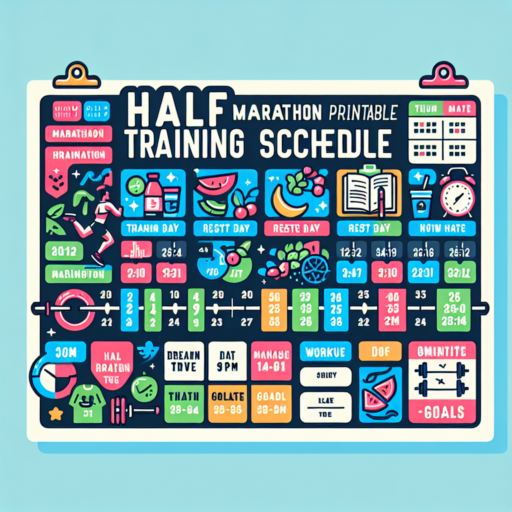When to start training for the Chicago Marathon 2024?
Preparing for the Chicago Marathon 2024 is an exciting endeavor that requires thoughtful planning and commitment. Starting your training at the right time is crucial for building endurance, strength, and confidence. Typically, a 16 to 20-week training plan is recommended for marathon preparation. For the Chicago Marathon, which usually takes place in October, this means kickstarting your regimen by early June or the last week of May, at the latest.
Understanding your current fitness level is key before embarking on this journey. Beginners might benefit from a longer pre-training phase to establish a solid running base, while experienced runners may adjust their start times based on previous marathon experiences and recovery statuses. It’s not just about adding miles; it’s about enhancing your running efficiency and resilience to prevent injuries.
Integrating variety into your training plan is also essential. This includes mixing long runs with speed work, hill training, cross-training, and rest days. Many runners overlook the importance of rest and recovery, which are pivotal for achieving peak performance. Moreover, setting smaller, interim goals leading up to the marathon can help keep your training on track and measure progress.
No se han encontrado productos.
How do you qualify for Chicago Marathon?
Qualifying for the Chicago Marathon, one of the six World Marathon Majors, is a goal sought after by runners all over the globe. The process to secure a place at the start line combines a mix of eligibility criteria designed to include runners of various levels and commitments. This article highlights the primary ways you can qualify for this prestigious event.
Qualification Through Time Standards
One of the most straightforward paths to qualification is by meeting the event’s time standards. These standards are set according to age and gender categories, providing a clear target for runners aiming to qualify based on their performance. Runners must have completed a marathon within a specific time frame, typically 18 months before the opening of the registration window for the Chicago Marathon. It’s important to note that these qualifying times are competitive, and runners must provide proof of their performance from a certified race to be considered.
Charity Runners
Another avenue for qualification is through the marathon’s Charity Program. The Chicago Marathon partners with several charities, offering guaranteed entry to participants who pledge to raise funds for their chosen cause. This option not only grants access to the marathon but also allows runners to make a positive impact. The fundraising minimums vary by charity, so it’s essential to commit to a figure that you’re comfortable with and confident in raising.
Lottery Entry
For those who don’t meet the time standards or choose not to run for a charity, there’s still hope through the lottery entry system. The Chicago Marathon conducts a lottery to fill the remaining spots, giving runners a chance to secure a place at the starting line. While this option does not guarantee entry, it offers a chance to those who are eager to participate without the pressure of qualifying through other means. Participants simply need to register for the lottery during the open registration period and await the drawing results.
How long does it take to run the Chicago Marathon?
The duration it takes to run the Chicago Marathon can vary widely among participants. While professional elite runners can complete the marathon in just over 2 hours, the majority of participants will take longer. The average finish time for the marathon typically falls around the 4 to 5-hour mark. Factors such as individual pace, training level, and weather conditions on the day of the race can significantly affect completion times.
For those aiming to run the Chicago Marathon, understanding the dynamics of the race is crucial. Past data indicates that the median finish time for men is approximately 4 hours and 22 minutes, while for women, it is around 4 hours and 47 minutes. These times reflect the vast range of participants, from seasoned athletes to first-time marathon runners.
Training for the marathon is a key determinant in how long it may take to complete the course. Runners dedicated to a consistent training regimen, focusing on both endurance and speed work, can potentially see substantial improvements in their finish times. Weather on race day also plays a pivotal role; cooler temperatures often result in faster race times, while warmer conditions can slow runners down.
How to prepare for the Chicago Marathon?
Preparing for the Chicago Marathon requires a well-thought-out plan that touches on various aspects of training, nutrition, and mental readiness. First and foremost, building a solid training base that gradually increases in mileage and intensity is crucial. It’s not just about the long runs; incorporating interval training, tempo runs, and recovery runs will help build endurance and speed while minimizing the risk of injury.
Developing a Training Schedule
Creating a personalized training schedule is pivotal. This plan should start about 16 to 20 weeks before the marathon date, allowing your body ample time to adapt to the rigors of marathon training. Be sure to include rest days in your schedule to permit your body to recover. Additionally, incorporating cross-training activities such as cycling or swimming can enhance cardiovascular fitness without the added stress on your running muscles.
Nutrition and Hydration Strategies
Equally important is focusing on your nutrition and hydration. Consuming a balanced diet rich in carbohydrates, proteins, and healthy fats will fuel your long runs and aid in recovery. Hydration is also key, particularly in the weeks leading up to the marathon. Start practicing your hydration strategy during your training runs to find what works best for you, ensuring you’re well-hydrated in the days leading up to the race.




